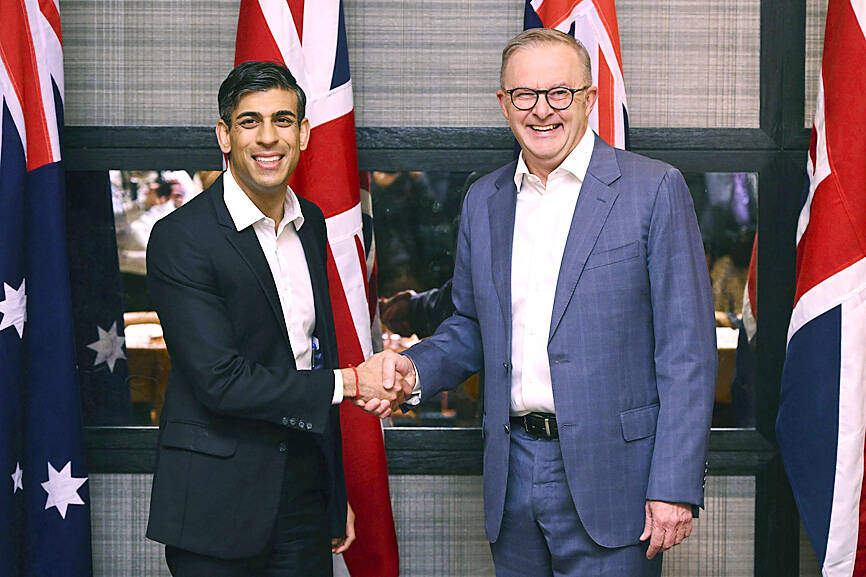The leaders of Australia, the UK and the US were to announce plans for a new fleet of nuclear-powered submarines yesterday, as they deepen the AUKUS defense partnership aimed at countering China in the Pacific. Upgrading Australia’s aging sub fleet is a lynchpin of that effort.
However, Australia might not get its first submarine for at least 10 years, and the deal is fraught with potential delays and uncertainty.
It calls for Australia to get a new type of submarine jointly built with the UK that does not yet exist. In the meantime, the US would offer its Virginia-class submarine, whose production has been plagued by billions of US dollars of cost overruns.

Photo: AP
There is also the matter of Australian defense spending. A single Virginia-class sub costs about US$3.5 billion, which is more than 10 percent of Australia’s annual US$30 billion defense budget.
Australian officials say the pricey upgrade from its current diesel-powered subs is needed to drive the US-led agreement.
US President Joe Biden was to meet with British Prime Minister Rishi Sunak and Australian Prime Minister Anthony Albanese yesterday in San Diego, California, to unveil plans to develop the new submarine.
It would be a milestone in the young partnership, which was established in 2021 to counter growing Chinese naval might in the Asia-Pacific region.
Under AUKUS, the three nations share classified military capabilities, including technology for nuclear-powered subs, as well as cooperation in a range of areas including hypersonic missiles, artificial intelligence and quantum computing.
Officials hope the AUKUS deal’s rocky start would not be an omen, after Australia angered France when it canceled a submarine contract with France in 2021
However, already there are questions: Why develop an entirely new submarine for Australia while also selling it US submarines?
“I suspect that the most likely ultimate outcome would be Australia going ahead and increasing its purchase of Virginia-class submarines and eventually forgoing the new design due to cost concerns,” said Zack Cooper, a senior fellow at the American Enterprise Institute and a former Pentagon official.
“This could become a Frankenstein project,” he said.
The announcement is meant to show the deepening defense bond between the US, the UK and Australia for decades to come, and to put China on notice that it would face significant hard-power resistance should it press ahead with a potential invasion of Taiwan and aggressive actions in the South China Sea.
In a speech last month, Albanese called the security arrangement the “biggest leap in our defense capability in our history.”
He described the Australia-UK-US accord as the “future,” saying Australia has long known that “partnerships and alliances are key to our security.”

SECURITY: As China is ‘reshaping’ Hong Kong’s population, Taiwan must raise the eligibility threshold for applications from Hong Kongers, Chiu Chui-cheng said When Hong Kong and Macau citizens apply for residency in Taiwan, it would be under a new category that includes a “national security observation period,” Mainland Affairs Council (MAC) Minister Chiu Chui-cheng (邱垂正) said yesterday. President William Lai (賴清德) on March 13 announced 17 strategies to counter China’s aggression toward Taiwan, including incorporating national security considerations into the review process for residency applications from Hong Kong and Macau citizens. The situation in Hong Kong is constantly changing, Chiu said to media yesterday on the sidelines of the Taipei Technology Run hosted by the Taipei Neihu Technology Park Development Association. With

CARROT AND STICK: While unrelenting in its military threats, China attracted nearly 40,000 Taiwanese to over 400 business events last year Nearly 40,000 Taiwanese last year joined industry events in China, such as conferences and trade fairs, supported by the Chinese government, a study showed yesterday, as Beijing ramps up a charm offensive toward Taipei alongside military pressure. China has long taken a carrot-and-stick approach to Taiwan, threatening it with the prospect of military action while reaching out to those it believes are amenable to Beijing’s point of view. Taiwanese security officials are wary of what they see as Beijing’s influence campaigns to sway public opinion after Taipei and Beijing gradually resumed travel links halted by the COVID-19 pandemic, but the scale of

A US Marine Corps regiment equipped with Naval Strike Missiles (NSM) is set to participate in the upcoming Balikatan 25 exercise in the Luzon Strait, marking the system’s first-ever deployment in the Philippines. US and Philippine officials have separately confirmed that the Navy Marine Expeditionary Ship Interdiction System (NMESIS) — the mobile launch platform for the Naval Strike Missile — would take part in the joint exercise. The missiles are being deployed to “a strategic first island chain chokepoint” in the waters between Taiwan proper and the Philippines, US-based Naval News reported. “The Luzon Strait and Bashi Channel represent a critical access

Pope Francis is be laid to rest on Saturday after lying in state for three days in St Peter’s Basilica, where the faithful are expected to flock to pay their respects to history’s first Latin American pontiff. The cardinals met yesterday in the Vatican’s synod hall to chart the next steps before a conclave begins to choose Francis’ successor, as condolences poured in from around the world. According to current norms, the conclave must begin between May 5 and 10. The cardinals set the funeral for Saturday at 10am in St Peter’s Square, to be celebrated by the dean of the College